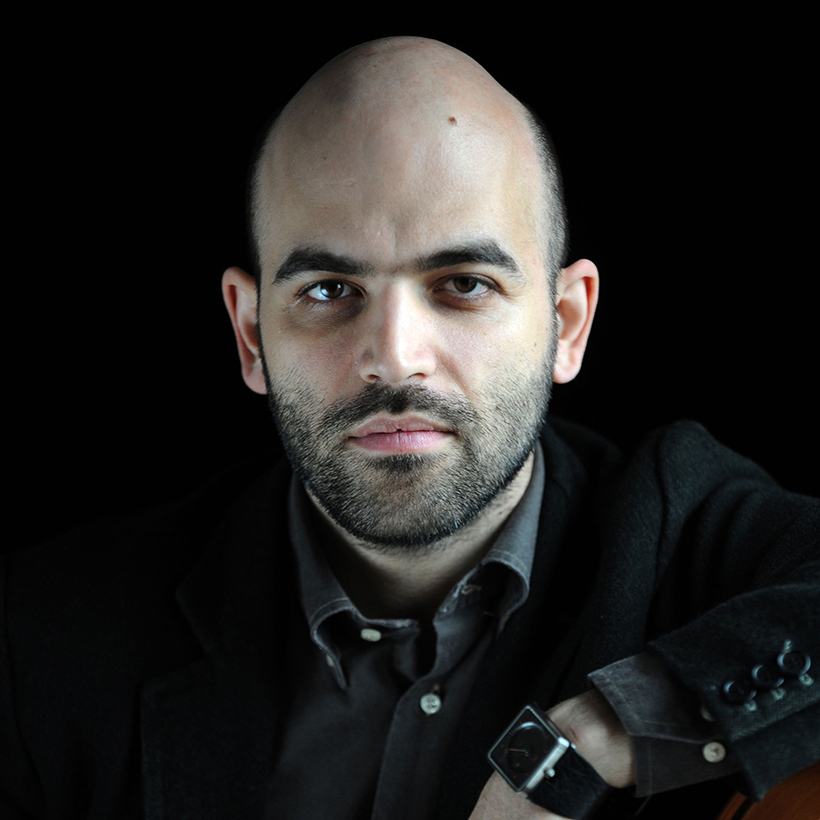“The hungry aren’t particular about which oven their bread comes from,” goes an ancient saying the Mafia lives by—organized crime thrives when people are desperate. Roberto Saviano, Italy’s most famous investigative reporter, is warning the world that as the coronavirus steals lives and livelihoods, it is also enriching mobsters who provide services that governments can’t.
Saviano has to sound his alarm from an undisclosed location. Now 40, the writer has been in hiding since the publication, in 2006, of his book Gomorrah, a fictionalized account of Saviano’s infiltration of the Camorra, the organized crime group that reigns over Naples’s Campania region. His newest book, Savage Kiss, a novel about the boy bosses of Naples, is out from Farrar, Straus and Giroux this week in a translation by Antony Shugaar.
Saviano’s face is famous within Italy but not easily recognized beyond, perhaps because Saviano does little to pump up his own mystique. Instead, he takes the Anthony Fauci approach to spreading his message: talk about it as much as he can, to whoever will listen. He is a regular contributor to La Repubblica and The Guardian, and in recent months has focused on the effects of the coronavirus on organized crime. “Emergencies are the best allies for affairs that function on speed and obscurity,” Saviano wrote last month in La Repubblica. “Organized crime is taking full advantage of the pandemic and its side effects—money can move around faster, controls are lowered.” Sure enough, the latest data from Italy’s Ministry of the Interior puts usury—illegal loans in place of bank ones—up 9.6 percent compared to the same time last year.
Disaster Preparedness
During the plague in the 1600s, Milan’s beleaguered government tasked the city’s criminal gangs with controlling the streets. In the late 1800s a similar thing happened during Italy’s cholera epidemic—criminal groups managed the disposal of corpses—and as recently as the 2008 financial crisis, the Mafia intervened to save the banks. As revealed by Antonio Maria Costa, head of the U.N. Office on Drugs and Crime, more than $300 billion in criminal proceeds kept the financial system afloat during that time—“In many instances, the money from drugs was the only liquid investment capital,” Costa said in 2009. So the fact that it’s happening today is nothing new.
In 2019 it was revealed that the ‘Ndrangheta, the organized crime group that operates in Italy’s Calabria region, had been infiltrating the Lombardian medical industry and even sending its operatives to train in medicine and nursing—perfect timing, it turns out, for when the northern Italian region would become Italy’s coronavirus hotspot. Meanwhile, the Camorra has kept busy delivering essentials straight to people’s homes. In Naples’ poorest neighborhoods, where most are out of work, the clan is stepping in to provide welfare. Along with the door-to-door service comes an unspoken price tag: people who have no option but to accept help from the Camorra will end up in debt to the clan.
It was revealed that the ‘Ndrangheta had been infiltrating the medical industry, even sending its operatives to train in medicine and nursing.
Though organized crime is most associated with Italy, Saviano has become known for reporting on its global influence. “What’s going on with criminal money these days reminds me of when countries from the U.S. to Germany were proclaiming their solidarity with Italy during its first days of the coronavirus, as if it was a problem unique to us, caused by our mismanagement, misfortune, genetic predisposition, and general underdevelopment,” he wrote in La Repubblica. “A few weeks later they found themselves with the virus all over. The same thing applies when it comes to dirty money. It’s considered a problem only in fragile economies—southern Italy and Eastern Europe. False.”
As press attention focuses on protests in Belarus—and the U.S.—coverage of Saviano’s critiques of Western economies have been comparatively underreported. Discussing the cocaine trade this past June with the British paper iNews—Saviano wrote a book on the subject called Zero Zero Zero in 2013—he told Kaleem Aftab that London is the world’s most corrupt city. “First, it’s the capital of consumption. And secondly, it is the home of money laundering....90 percent of money laundering is done in Europe and North America. London, at the moment, is the real capital of money laundering in the world.” Saviano has also taken aim at Germany, pointing to its rank of No. 14 in the Tax Justice Network’s corruption list (just beating Panama, who took the No. 15 spot).
The Camorra’s strategy of currying favor with the poor has been adopted outside of Italy, as well. In Mexico, the Gulf cartel delivers basics to the elderly and needy in the border city of Matamoros, while the rising Jalisco New Generation Cartel labels its boxed provisions much like an NGO or charity would. And in Guadalajara, aid packages come with a photo of Joaquín “El Chapo” Guzmán, leader of the Sinaloa cartel and currently residing in a maximum-security prison in Florence, Colorado.
Erdogan & Berlusconi & Gaddafi, Oh My!
Saviano’s interests don’t stop at organized crime—he’s vocal on issues ranging from President Erdogan’s treatment of journalists (Saviano has called the Turkish leader “presidente assassino”), to the Black Lives Matter movement and U.S. politicization of coronavirus safety measures, to immigration in his home country. Saviano blames the current crisis—boats full of migrants sinking in the Mediterranean, others making it to the Italian stepping-stone island of Lampedusa only to be turned back—on the deal former Italian prime minister Silvio Berlusconi struck with Gaddafi in 2011, two years before the Libyan dictator’s death. Known for his bizarre chumminess with Gaddafi, Berlusconi agreed to pay him $5 billion in reparations for Italy’s colonial rule; in return, Gaddafi would cooperate in sending immigrants back to Libya. (Saviano will be happy to know that Berlusconi has just tested positive for the coronavirus.)
Two years ago Saviano began trading angry tweets on immigration with far-right Lega party leader Matteo Salvini, then the Deputy Prime Minister of Italy. The exchange culminated in Saviano’s calling Salvini “Il ministro della mala vita,” which roughly translates to “minister of the criminal world” and is a reference not only to Lega connections with the ‘Ndrangheta, but to 1910, when the phrase was directed at the Italian prime minister Giovanni Giolitti by the anti-fascist intellectual Gaetano Salvemini. Saviano told the Observer at the time, “The difference between 1910 and now is that Salvemini was not prosecuted for his opinions, while I’m being taken to trial.”
Indeed, Salvini, who as a member of government was charged with Saviano’s protection, is now suing him for defamation. If and when the case goes to trial, Saviano faces three years in prison.
“The difference between 1910 and now is that Salvemini was not prosecuted for his opinions, while I’m being taken to trial.”
Writing a barely disguised mafia tell-all is a dangerous business, and Saviano has seven trained bodyguards, travels with two bulletproof cars, and changes location every few days. He rarely goes outside. Asked this past March whether he regrets having written Gomorrah, Saviano says yes. “I’d like to say I don’t regret it, that I’d do it all again, but that rings false,” he said in a rare open-air interview with Australian reporter Emma Alberici. “I do regret it. But I don’t disown it. I go on and move forward out of revenge, which isn’t a noble sentiment, but it’s one that animates me. Revenge against those who have forced me to live like this, and against those who hate me.”
Saviano has helped adapt both Gomorrah and Zero Zero Zero for the screen. The former was turned into a 2008 film directed by Matteo Garrone and then, in 2014, into a popular television series; the TV series ZeroZeroZero premiered earlier this year. Saviano is currently at work on a series on Gaddafi produced by Sky Italia and Entertainment One. He’s also the author of a pair of novels on the mafia’s youngest members, the first of which, The Piranhas, was published in the U.S. in 2018; Saviano adapted the story into a film that won the Best Screenplay award at the 2019 Berlin Film Festival. Its sequel, which has already become a bestseller in Italy, is Savage Kiss.
Saviano has been accused of glorifying crime through his books and movies, and the mayor of Naples has even claimed that the city saw a spike in violent incidents every time a new episode of Gomorrah was aired. Michael Lewis reports a similar story—after writing Liar’s Poker, his 1989 book exposing Wall Street greed, he got letters from young professionals asking for tips on how to get an edge in finance. Just as Lewis expressed his incredulity, Saviano has denied any intention to embellish the subjects of his reporting. He also has a life confined to four anonymous walls to show for it.
In classic Italian form, no date has been fixed for Saviano’s defamation trial, and if anything he has become more vocal since the charges were filed. In his mind, he’s got nothing to lose.
Julia Vitale is the Senior Editor for AIR MAIL

